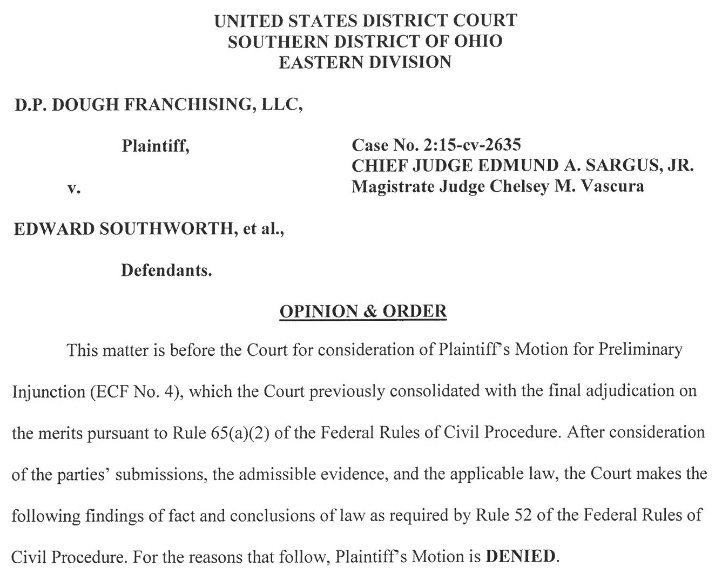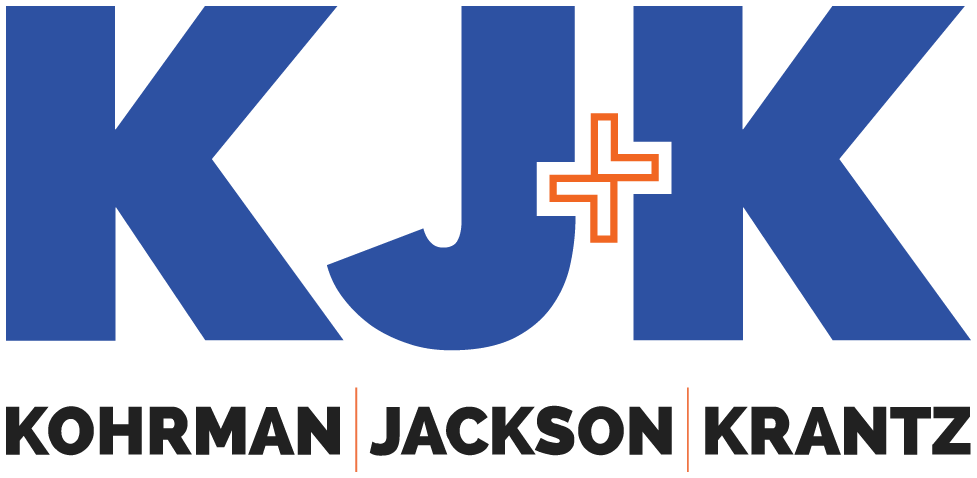As lead trial counsel in a two-week jury trial defending a small business and its CEO against sexual harassment claims originally by six plaintiffs where the CEO admitted having sex with 8 employees seeking more than $3 million, KJK attorney Samir Dahman obtained a jury outcome essentially giving only one plaintiff just $16,000.
News
Dahman and Ten Other KJK Attorneys Selected as Super Lawyers
Samir Dahman, the Partner in Charge of Kohrman Jackson & Krantz, LLP’s Columbus office, was selected for the fifth consecutive year as a 2018 Business Litigation Super Lawyers in Columbus by Ohio Super Lawyer magazine, following two years of being selected as a Rising Star.
Ten other KJK attorneys were also selected as Super Lawyers or Rising Stars, including Senior Partner Robert H. Jackson, Managing Partner Jon J. Pinney, Sarah J. Gabinet, Robert S. Gilmore, Jon W. Groza, Ari H. Jaffe, Justine L. Konicki, Brett S. Krantz, Alan M. Rauss, and Susan O. Scheutzow.
The Super Lawyers selection process evaluates lawyers based upon multiple criteria, including professional achievement and peer recognition; honors and awards; firm and bar involvement and leadership; scholarship and professional writings; community service and pro bono activities; and other outstanding achievements.
“Rising Stars” are the top up-and-coming attorneys who are no more than 40 years old or who have been practicing for no more than 10 years.
To the Victor Go the Spoils (and the Calzones)!
Samir Dahman, Partner in Charge of KJK’s Columbus office, and his client are savoring a recent victory in a bitter intellectual property dispute between a franchisor and former franchisee who both serve calzones.
The franchisor – D.P. Dough – asserted nine (9) claims, including: trademark, trade dress, and copyright infringement; breach of contract; misappropriation of trade secrets; Ohio Deceptive Trade Practices Act, unfair competition, tortious interference with business, and unjust enrichment – against the former franchisee who went out on his own to open calzone restaurants in Southeastern college towns. Most concerning, however, was the franchisor’s motion for an injunction that would have required the former franchisee and Mr. Dahman’s client to close his two operating restaurants.
But instead going through discovery and allowing the case to play out normally, D.P. Dough asked the U.S. District Court for the Southern District of Ohio to hold an immediate hearing on an injunction to force Mr. Dahman’s client to close his two restaurants.
At the injunction hearing, which was converted to a trial under Rule 65(a)(2), Mr. Dahman debunked all of D.P. Dough’s claims, even though D.P. Dough was represented by the venerable attorneys of the Taft firm. D.P. Dough was so concerned that they would lose the injunction, and effectively the case, that it asked Mr. Dahman’s client if it would like to mediate. So the parties attended mediation and thought they may have reached a settlement. As it were, negotiations fell apart and the parties sought the Court’s guidance on the purported settlement. Eventually, the Court held there was no settlement and allowed the injunction to be decided.
With the settlement snafu over, the parties anxiously awaited the Court’s decision that would end the whole case – and possibly Mr. Dahman’s client’s successful fledgling restaurants.
Just as college students were getting settled back into their classes, Chief Judge Edmund A. Sargus, Jr. issued the Court’s decision finding that D.P. Dough likely could not succeed on the merits of its claims, and even if it could there was no irreparable harm to the business, while Mr. Dahman’s client’s businesses would be forced to shut down. In doing so, the Court found in Mr. Dahman’s client’s favor on all nine of D.P. Dough’s claims. The decision is reported at D.P. Dough Franchising, LLC v. Southworth et al., No. 2:15-cv-2635, 2017 U.S. Dist. LEXIS 157951 (S.D. Ohio Sep. 26, 2017).
Following the decision Mr. Dahman’s client’s principal stated “we were confident that their claims were baseless, are thankful the Court came to the right outcome, and are excited to getting back to what we do best – crafting quality calzones for hungry students.” Mr. Dahman added “we are fortunate to have an insightful bench in the Southern District of Ohio as well as a skilled team.”
If you need a skilled and passionate advocate, contact Mr. Dahman at sdahman@dahmanlaw.com or 614.636.1250.

DP Dough Opinion
Berkshire Triathlon Raises $21,000 for Flying Horse Farms and Ronald McDonald House
Mr. Dahman, as co-founder of the Berkshire Triathlon, is pleased to announce that the 2017 Berkshire Triathlon raised $21,000 for Flying Horse Farms and Ronald McDonald House of Central Ohio.
This year was the Berkshire Triathlon’s most successful year with 160 participants raising $18,000 for Flying Horse Farms and $3,000 for the Ronald McDonald House of Central Ohio.
This could not have done this without KJK as the Presenting Sponsor and supporting sponsors City Barbecue, Greenswell, Pediatric & Adolescent Medicine, tinytitan, Derrick Layer Custom Homes & Remodeling, Pure Dental, Abercrombie & Fitch, Collins & Slagle, The Arlington Bank, ARM, Acre, and Scotts Miracle-Grow.




Dahman Presents on M&A of Privately Held Businesses
I enjoyed presenting at the National Business Institute’s continuing legal education seminar Business Law: From Start to Finish on June 27, 2017. My segment was on Clarifying Procedures in Mergers and Acquisitions of Privately-Held Companies. More info can be found here: Business Law Start to Finish
Dahman Presents at Workplace Violence Seminar
I’m honored and excited to present Allied Universal’s Workplace Violence Seminar on Planning & Prevention on May 10, 2017. More info can be found here: http://pages.aus.com/rs/761-TOW-449/images/052017%20-%20WPV%20Seminar%20Agenda%20-%20Columbus.pdf
Dahman Speaks at Upper Arlington Cum Laude Society Induction
I was very honored and excited to speak at the Upper Arlington H.S. Cum Laude Society induction banquet on March 26th. I spoke about resilience and compassion.
Founded in 1906, the Cum Laude Society is dedicated to honoring scholastic achievement in secondary schools. The founders of the society modeled Cum Laude after Phi Beta Kappa and in the years since its founding, Cum Laude has grown to 382 chapters, approximately two dozen of which are located in public schools and the rest in Independent schools. Membership is predominantly in the United States, but chapters also are located in Canada, England, France, Spain, Puerto Rico and the Philippines.
Here is a video of the speech:
Dahman and Wife Bestowed with Distinguished Alumni Leader Award
Samir Dahman, Partner in Charge of KJK’s Columbus office, has been recognized for his significant contributions to the community and will be presented with the 2017 Distinguished Alumni Leader Award. The award, bestowed by Leadership Upper Arlington, is given annually to an alumnus who has had a positive impact on the Upper Arlington community following their graduation from the adult leadership program.
The award is based on the hard work of Samir – and his wife Amalee – in founding and operating The Berkshire Triathlon which has raised over $45,000 to help children with serious illnesses by supporting Flying Horse Farms, Nationwide Children’s Hospital and Ronald McDonald House Charities through the proceeds of this grassroots event. The Berkshire Triathlon is a tax-exempt 501(c)(3) nonprofit organization registered with the IRS as Two Bears Foundation, Inc.
As Partner in Charge of KJK’s Columbus office, Samir provides leadership to the office’s talented team of partners, associates and legal analysts, while counseling clients on commercial litigation, business law, estate planning and employment law in Ohio, Michigan and federal courts. He is known for taking a sincere and serious approach to every one of his clients’ matters.
Video of Dahman Presenting at Supreme Court of Ohio Symposium
Here is the video of my talk about resilience at the Supreme Court of Ohio’s Commission on Professionalism’s Symposium on October 21, 2016:
Estate Planning for Small Business Owners
Having an estate plan is important for all families, but it’s crucial for small business owners. Small business owners have a lot at stake and need to plan for the future to ensure their wishes for their company are carried out. What should you, as a small business owner do to ensure the success of your company long after you’re gone? KJK put together a few tips to make estate planning seem less overwhelming.
First, you need to sit down and think about what you want to happen when you pass away and how you want to provide for your family and business. If you don’t come up with a plan, the laws of intestacy will govern how your property and assets are distributed, which doesn’t often match everyone’s desires. Do you want your minor children to get their share of your assets right away or do you want a trust to hold the assets for your children until they reach a particular age? As you’re thinking about these things, make sure to also give due consideration to the potential for incapacitating lifetime disabilities. If you create a durable power of attorney now, which appoints someone to handle your property and financial matters, it avoids the burdensome process of trying to do so when it’s too late. Durable powers of attorney can be in effect for your entire life, or you can set them to “spring” when you become disabled or incapacitated. You should also appoint someone to handle your healthcare decisions. A healthcare power of attorney will make medical decisions for you if and only if you are unconscious or unable to do so yourself.
Second, you need to make preparations for your company. One of the first things you should do is to make sure your business is structured to protect you from creditors. Operate as an LLC or an S-Corporation, not as a sole-proprietorship or general partner. These structures avoid personal liability, although they are not bullet-proof, hence the need for a comprehensive estate plan. You also need to follow all corporate formalities. These things can help protect you and your company from liability while you are alive and after you pass away. You also need to come up with a succession plan that answers the important questions your business partners and employees may have after you’re gone. Where do you want your stock go when you pass away? Do you want your spouse, children, or other family members to gain control of the business? Your business partners may not want your family involved in the business if they are not already a part of it. In this case, a buy-sell agreement with a funding mechanism (such as an insurance policy on the life of the shareholders) could alleviate your partners’ concerns and still give you plenty of control. No matter what the answers to these questions may be, make sure to avoid a forced sale. Forced sales often yield poor prices.
Third, you should implement an asset protection plan now, before liability arises. Small business owners often sign personal guarantees to acquire assets or credit for their business. Additionally, if the business owns customer-accessible property (for example, a store as compared to an office or warehouse which customers don’t visit), the owners can be liable for accidents, such as slip and falls, which occur on the property. It is important to set up an estate plan now to secure assets because if a business owner waits until after they default on a loan or get sued for customer injury, it is often too late to protect assets. This is because if you make transfers into an estate plan (or to other family members or friends) after liability arises, the court may consider those transfers a fraudulent attempt to hide assets from creditors, and can invalidate those transfers – leaving those assets unprotected. Essentially, once a creditor or injured party is in the picture, it’s too late to prepare, but proactively establishing an estate plan greatly improves your chances to shield your assets. Why allow a creditor to undo all of your hard work when you can easily implement an estate plan now to ensure you’re protected?
It is important to keep in mind that making an estate plan should not be a one-time occurrence. Your estate plan should evolve over time. Every 3 to 5 years you should review it to see if your needs or decisions have changed. Please contact KJK’s Wealth Planning practice group to move forward with an estate plan that is right for you and your business.

